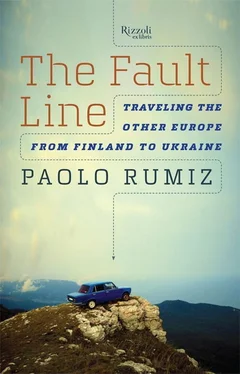On an afternoon of alternating sun and sleet, I go to the airport to meet Monika, my companion. She’ll be my escort all the way to the end of the journey.
She’s a photographer and a writer. Born in Warsaw, she speaks Russian, and on the frontiers of the East, the terrain of my journey, she knows her way around perfectly. She has an innate talent for making herself be accepted. She’s been accepted by the Berbers of the High Atlas Mountains in Morocco, by Belarusians, Bulgarians, Sudanese, Iranians, Afghans, and Bengalese. For years she has gone in search of the lost peoples between the Baltic and the Black seas—Lemkos, Hutzuls, Boykos, Gypsies of every origin, the Gagauzi of Moldavia, the Tartars of Belarus, Caucasian Albanians and Udins—and peoples of borderline religious faiths like the Dönmeh in Turkey, practitioners of a hybrid of Judaism and Islam; or the Rifa’i Sufi; or again the Old Believers, a collection of Russian Orthodox splinter groups who have refused any modernization of the original liturgy. Her dense and varied biography bespeaks a woman who has lived for eighty years rather than her forty-two. When I see her coming down the stairs from the plane, I realize her backpack has even less space for clothes than mine, because of the bulky telescopic lens and dozens of rolls of film she has to carry.
The color of the sky is changing constantly. We leave right away to go looking for images, and the town, which up until yesterday was deserted, suddenly seems crowded. But with Russians. Herring fishermen, traffickers, miners, ex–political refugees. We can see they are Russians from a mile away because of their more aggressive walk, their Slavic gestures, the musicality of their language. To go from Norwegian to Russian is to enter a whole new world. With the Russians, the vowels take their revenge against the guttural consonants of the North; the i ’s triumph, frequent and variegated as the birch trees. Around town, the signs are often bilingual; I read in Cyrillic: Gostinitza (Hotel) and Klub Moryakov (Mariners’ Club). On the hill, next to an antiaircraft shelter from the Second World War, there’s a monument to the unknown Soviet soldier, which nobody dreams of taking down, even if only to avoid irritating Putin.
In the harbor, a dozen deep-sea fishing boats from Murmansk are napping at the dock, waiting to be careened. Mythological tramp steamers, flags flapping in the wind, arranged in rows of three. An extinct species where I come from. The Russian sailors greet us and, unlike the Norwegians, they’re anxious to talk. So we’re invited to go aboard the Kolmykova , a huge beast with a crew of thirty, specialists in autumn giant-crab fishing. To get to it, we have to cross over two more iron-laden tramps and three gangplanks. The captain—a mild-mannered man from Murmansk by the name of Nikolai—welcomes us in his slippers. He takes me up to the bridge and tells me that those monster crabs with claws up to six feet long are native to the peninsula of Kamchatka and were brought here about thirty years ago by Russian scientists. They thrived so well that they multiplied well beyond their normal rate and ate up everything, even the algae on the sea bottom. A disaster. Today hunting them down is a public service, even more so because they are exquisite, and restaurants pay through the teeth for them. “A nice problem,” I say to the captain.
“I’d call it a succulent problem,” Nikolai Alexandreyevich laughs, licking his mustache. Our conversation has gotten off to a good start.
He takes me into the cabin of the radio telegrapher and shows me on the computer some apocalyptic images of the fishing boat covered with ice in a storm-tossed sea. On the cabin walls, an icon of Saint Nicholas cohabits happily with the tits of a blond worthy of a truckers’ calendar. The computer prints out a collection of frightening images of the armored monster of the depths.
The bearded telegrapher asks me where I’m from.
I say, “Trieste.”
He responds, “I see, I see. We’re on the southern coast of the northern sea and you’re on the northern coast of the southern sea.”
A geographic treatise in one sentence. These people are solid, modest, and happy-hearted. I say this to the captain.
“You know what we call the Norwegians, we Russians? Zamorozhenniye , the frozen ones.”
I ask him how long their fishing trips last.
“Five to six months, nonstop.”
“And the sea,” I ask again, “how rough can it get?”
“Force nine.”
“Ah, I thought the maximum was force seven.”
Nikolai asks me to go up to the fabrika , the assembly line, which, out on the high seas, swallows up giant crabs from Kamchatka, cooks them, and freezes them for the restaurants of Norway. I follow him through a labyrinth of stairways and gangways and end up in the slaughterhouse, the first stage of the production line, bristling with sharp corners and hidden dangers, where the crabs are stripped of their claws and submerged in boiling water.
“Imagine working in here during a storm at sea. We wear gloves to pull the claws off; it’s a job that can be done only by hand. Then we stick them in the cages and boil them. It’s not easy, some of them weigh as much as forty-five pounds.”
“How much do you earn?”
“A percentage, about fifty cents a pound to divide among thirty men.”
“And how much do the restaurants pay?”
“Fifteen dollars a pound.”
“That’s a tough job, captain.”
“Yeah, but you got to eat somehow.”
During the summer, only six of the crew remain aboard. They are painting what in the summer becomes their second home, and I have to be careful not to get my pants smudged with orange paint. We go down to the stern, to the point where they launch the nets with their immense tackle. Some decapitated fish are hanging from one of the bulkheads, where they’ve been put out to dry.
Alexandreyevich pulls one off the line—the biggest, more than five pounds—wraps it in some paper, and gives it to me to wish me a good trip. In the North, a fish is an important gift, a traditional gesture of Christian charity, which in the Russian world cannot be refused. And because it will take me days to finish it, I decide to hang it from my backpack and carry it across the border with me; why not?—just to see the faces of the customs officers. I’m delighted; I’ll ride my silvery codfish all the way to Red Square in Moscow, just like Mathias Rust and his airplane. My pockets are jingling with cute little Norwegian coins with a hole in the middle. We’re off to the East. Between us and the United States, there is nothing but Russia.

2. BARENTS
THEY’VE SEEN EVERYTHING, these Russian soldiers on the lonely border with Norway: smugglers of furs or enriched uranium, businessmen in tinted-glass luxurymobiles, salmon fishermen, maverick geologists and metal merchants (northern Scandinavia is an open-pit mine), sailors from the high seas, and emissaries from Gazprom carrying top-secret dossiers. The Kirkenes border is not a place for tourists. It’s crossed by a handful of people every day, all for a very special reason. But a Westerner with a fish hanging from his backpack is something the guards here have never seen. I’m talking about the dried cod I was given by Nikolai Alexandreyevich, the Kamchatka giant-crab fisherman, which I have stubbornly decided to bring with me.
The scene: a concrete pillbox in the middle of the snowfields, on the shoreline road of a still thinly frozen lake, a funereal gray layer of freshly spread asphalt, sparkling with crystals of mica. A deserted landscape, with no lines of trucks, no waiting cars, enclosed by a fence, sealed off by bars, surveilled by spotlights and guard towers. A traveler with an EU passport and a business visa arrives in this place with a shiny, pewter-colored fish, silver with copper highlights, covered in plastic wrap, hanging from his backpack, smelly as ten sea bass left out in the sun. He emerges from the tundra, presents himself at one of the most militarized borders in the world, and offers his papers to a guard as pressed and polished as a Coast Guard Academy graduate on his first day on the job.
Читать дальше













